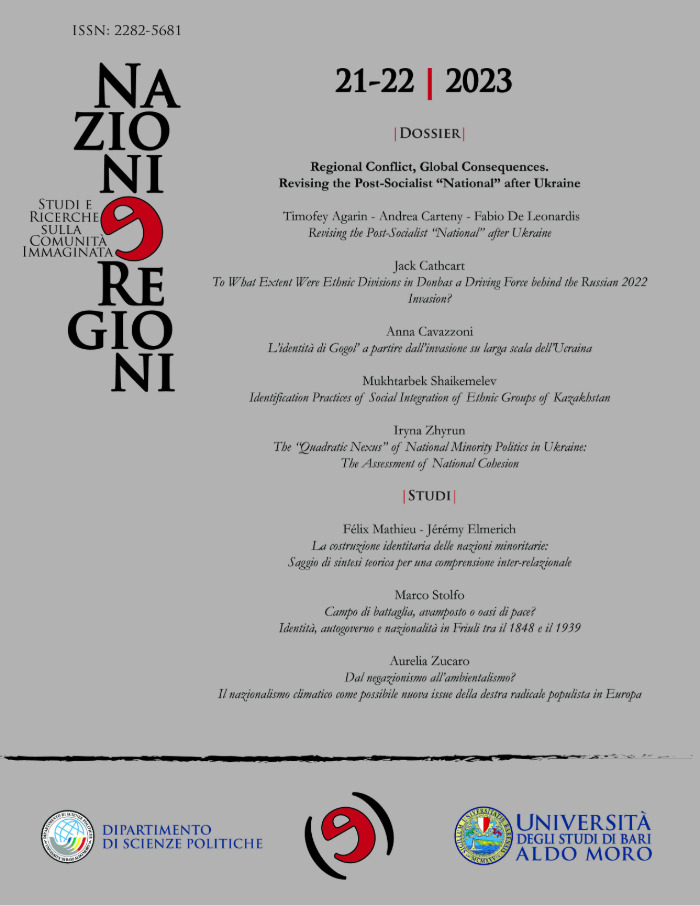Dal negazionismo all'ambientalismo? Il nazionalismo climatico come possibile nuova <i> issue </i> della destra radicale populista in Europa <br> <br> From denialism to environmentalism? Climate nationalism as the possible new issue of the populist radical right in Europe
DOI:
https://doi.org/10.15162/2282-5681/1941Parole chiave:
Comunicazione politica, nazionalismo, clima, destra radicale, partiti, political communication, nationalism, climate, radical right, partiesAbstract
Nonostante la maggior parte della letteratura concordi sul fatto che l’ambientalismo è un tema a cui la destra radicale guarda con scetticismo, assumendo spesso posizioni negazioniste quando ci si riferisce al cambiamento climatico antropogenico (ACC), studi più recenti hanno rilevato un cambiamento di rotta nella narrativa dei Populist Radical Right Parties (PRRP) in merito alla issue ambientale e nello spazio ideologico-politico del nazionalismo. In particolare, è stato fatto notare come tale tematica, attraverso la prospettiva del nazionalismo climatico, si presti a riempire l’ideologia “sottile” di questi partiti e a diventare una possibile nuova issue identificativa (al pari delle più dibattute immigrazione e sicurezza). Attraverso una revisione critica della letteratura, l’articolo propone una riflessione sul rapporto problematico che emerge tra nazionalismo e tema ambientale per i PRRP, nell’ottica degli studi sul reframing delle issue nello spazio della competizione elettorale.
Although most of the literature agrees that environmentalism is an issue that the radical right looks at skeptically, often taking denialist positions when referring to anthropogenic climate change (ACC), more recent studies have noted a shift in the Populist Radical Right Parties’ (PRRPs) narrative regarding the environmental issue and in the ideological-political space of nationalism. In particular, it has been pointed out how this issue, through the perspective of climate nationalism, lends itself to filling the “thin” ideology of these parties and becoming a possible new identifying issue (on par with the more debated immigration and security). Through a critical review of the literature, the article offers a reflection on the problematic relationship that emerges between nationalism and environmental issues for PRRPs, from the perspective of issue reframing studies in the space of electoral competition.
Riferimenti bibliografici
Behr R. L. – Iyengar S. (1985), «Television news, real-world cues, and changes in the public agenda», Public Opinion Quarterly, Vol. 49 n. 1, pp. 38-57.
Bentivegna S. – Boccia Artieri G. (2019), Le teorie delle comunicazioni di massa e la sfida digitale, Laterza, Bari.
Blowers A. – Leroy P. (1994), «Power, Politics and Environmental Inequality», Environmental Politics, Vol. 3 n. 2, pp. 197-228.
Bordalo P. – Tabellini M. – Yang D. (2021), «Issue Salience and Political Stereotypes», Harvard Business School Working Paper, 20-106, pp. 20-106.
Braun M. (2021), «Why Nationalism is Not the Right Doctrine to Combat Climate Change, A Central European Perspective», New Perspectives, Vol. 29 n. 2, pp. 197-201.
Brulle R. J. – Carmichael J. – Jenkins J. C. (2012), «Shifting Public Opinion on Climate Change: An Empirical Assessment of Factors Influencing Concern over Climate Change in the U.S., 2002–2010», Climatic Change, n. 114, pp. 169-188.
Bulli G. (2020), «Environmental Politics on the Italian Far Right: Not a Party Issue?», in Forchtner B. (ed.) (2020), The Far Right and the Environment: Politics, Discourse and Communication, Routledge, London, pp. 88-104.
Castells M. (2017), Comunicazione e potere, trad. it. di B. Amato e P. Conversano, Università Bocconi Editore, Milano [2009].
Colomer J. M. – Bale A. L. (2020), Democracy and Globalization. Anger, Fear, and Hope, Routledge, London.
Conversi D. (2020), «The Ultimate Challenge: Nationalism and Climate Change», Nationalities Papers, Vol. 48 n. 4, pp. 625–636.
Conversi D. (2022), Cambiamenti Climatici, Antropocene e politica, Mondadori, Milano.
Dawson J. I. (2000), «The Two Faces of Environmental Justice: Lessons from the Eco‐Nationalist Phenomenon», Environmental Politics, Vol. 9 n. 2, pp. 22-60.
De Bruin B. (2022), «Against Nationalism: Climate Change, Human Rights, and International Law», Danish Yearbook of Philosophy, n. 55, pp. 173-198.
De Nadal L. (2022), «Il populismo ambientale, ovvero come l’estrema destra diventa ecologista», VoxEurop, 24-II, https://voxeurop.eu/it/populismo-ambientale-come-lestrema-destra-diventa-ecologista/ (ultimo accesso 10-X-2023).
De Sio L. (2018), «The Geometry of Party Competition. Parties and Voters in the Issue Space», in Fisher J. et al. (eds.), The Routledge Handbook of Elections, Voting Behavior and Public Opinion. Routledge, Abingdon-New York, pp. 394-403.
De Sio L. (2021), «La competizione sulle issue come manipolazione politica», in Morlino L. – Sorice M. (eds.) (2021), L’illusione della scelta, Come si manipola l’opinione pubblica in Italia, LUISS University Press, Roma.
Duit A. (2016), «The Four Faces of the Environmental State: Environmental Governance Regimes in 28 Countries», Environmental Politics, Vol. 25 n. 1, pp. 69-91.
Eger M. A. – Mitchell J. – Hjerm M. (2021), «When I Was Growing Up: The Lasting Impact of Immigrant Presence on Native-Born American Attitudes towards Immigrants and Immigration», European Sociological Review, Vol. 38 n. 2, pp. 169-188.
Epstein L. – Segal J. A. (2000), «Measuring Issue Salience», American Journal of Political Science, Vol. 44 n. 1, pp. 66-83.
Fishel S. (2021), «Can Climate Nationalism Save Us?», New Perspectives, Vol. 29 n. 2, pp. 208–214.
Forchtner B. (2020), «Far-right Articulations of the Natural Environment: An Introduction», in Forchtner B. (ed.) (2020), The Far Right and the Environment: Politics, Discourse and Communication, Routledge, London, pp. 1-17.
Forchtner B. (2020a), «Looking Back, Looking Forward: Some Preliminary Conclusions on the Far Right and Its Natural Environment(-s)», in Forchtner B. (ed.) (2020), The Far Right and the Environment: Politics, Discourse and Communication, Routledge, London, pp. 310-320.
Forchtner B. – Lubarda B. (2022), «Scepticisms and Beyond? a Comprehensive Portrait of Climate Change Communication by the Far Right in the European Parliament», Environmental Politics, Vol. 23, n. 1, pp. 1-26.
Gemenis K. – Katsanidou A. – Vasilopoulou S. (2012), «The Politics of Antienvironmentalism: Positional Issue Framing by the European Radical Right», Paper prepared for the MPSA Annual Conference, 12-15 April 2012, Chicago, https://research.utwente.nl/en/publications/the-politics-of-anti-environmentalism-positional-issue-framing-by-2 (ultimo accesso 10-X-2023).
Green E. G. T. (2009), «Who Can Enter? A Multilevel Analysis on Public Support for Immigration Criteria across 20 European Countries», Group Processes and Intergroup Relations, Vol. 12 n. 1, pp. 41-60.
Hallin D. C. – Mancini P. (2003), Modelli di giornalismo, Mass media e politica nelle democrazie occidentali, trad. it. di S. Marini, Laterza, Bari.
Hamilton P. (2002), «The Greening of Nationalism: Nationalising Nature in Europe», Environmental Politics, Vol. 11, n. 2, pp. 27-48.
Hausknost D. (2019), «The Environmental State and the Glass Ceiling of Transformation», Environmental Politics Vol. 29, n. 1, pp. 17-37.
Huber R. (2022), «Populism and Climate Change», in Manucci L., (ed.) (2022), The Populism Interviews, A Dialogue with Leading Experts, Routledge, London.
Huber R. - Jankowski M. - Juen C. M. (2022), «Populist Parties and the Two-dimensional Policy Space», European Journal of Political Research, Vol. 62 n. 3, pp. 989-1004.
Jacob L. R. – Shapiro R. Y. (2001), «Presidents and Polling: Politicians, Pandering, and the Study of Democratic Responsiveness», Presidential Studies Quarterly, Vol. 31 n. 1, pp. 150-167.
Kashwan P. – Liu J. C. E. – Das J. (2022), «Climate Nationalisms: Beyond the Binaries of Good and Bad Nationalism», WIREs Climate Change, DOI:10.1002/wcc.815
Katz E. – Lazarsfeld P. F. (1955), Personal Influence: The Part Played by People in the Flow of Mass Communications, Routledge, London.
Keohane R. O. – Nye J. S. Jr. (2000), «Globalization: What’s New? What’s Not? (And So What?)», Foreign Policy , n. 118, pp. 104-119.
Keohane R.O. – Nye J. S. Jr. (2011), Power and Interdependence, Pearson, London.
Kølvraa C. (2020), «Wolves in Sheep’s Clothing? The Danish Far Right and ‘Wild Nature’», in Forchtner B. (ed.) (2020), The Far Right and the Environment: Politics, Discourse and Communication, Routledge, London, pp. 107-120.
Krange O. – Kaltenborn B. P. – Hultman M. (2021), «Don’t Confuse Me with Facts, How Right Wing Populism Affects Trust in Agencies Advocating Anthropogenic Climate Change as a Reality», Humanities And Social Sciences Communications, n. 8, pp. 255-265.
Kulin J. – Sevä I. J. – Dunlap R. E. (2021), «Nationalist Ideology, Rightwing Populism, and Public Views about Climate Change In Europe», Environmental Politics, Vol. 30 n. 7, pp. 1111-1134.
Latour B. (2018), Down to Earth: Politics in the New Climatic Regime, Polity Press, Cambridge.
Lazaridis G. – Tsagkroni V, (2015), «Securitisation of Migration and Far Right Populist Othering in Scandinavian Countries», in Lazaridis G. – Wadia K. (eds.), The Securitisation of Migration in the EU, The European Union in International Affairs, Palgrave Macmillan, London.
Lieven A. (2020), «Climate Change and the State: A Case for Environmental Realism», in Survival, Global Politics and Strategy, Vol. 62 n. 2, pp. 7-26.
Lockwood M. (2018), «Right-Wing Populism and the Climate Change Agenda: Exploring the Linkages», Environmental Politics, Vol. 27, n. 4, pp. 712-732.
Malloy T. H. (2009), «Minority Environmentalism and Eco-nationalism in the Baltics: Green Citizenship in the Making?», Journal of Baltic Studies, Vol. 40 n. 3, pp. 375-395.
McCombs M. E. – Shaw D. L. (1972), «The Agenda-Setting Function of Mass Media», The Public Opinion Quarterly, Vol. 36 n. 2, pp. 176-187.
Mearsheimer J. (2001), The Tragedy of Great Power Politics, W.W. Norton, New York.
Middleton A. (2016), «Populist Radical Right Parties and the Securitization of Migration in France», Independent Study Project (ISP) Collection, 2430.
Sunawar L. – Muhammad R. (2020), «Securitization of Immigration in Europe and Role of Populist Right-wing Parties», Margalla Papers, Vol. 24 n. 2, pp. 83-92.
Miscevic N. (1999), «Close Strangers», Studies in East European Thought, Vol. 51 n. 2, pp. 109-125.
Moor S. – Roberts A. (2022), The Rise of Ecofascism: Climate Change and the Far Right, Polity Press, Cambridge.
Morlino L. – Piana D. – Raniolo F. (eds.) (2012), La qualità della democrazia in Italia, 1992-2012, Il Mulino, Bologna.
Morlino L. – Raniolo F. (2022), Disuguaglianza e democrazia, Mondadori, Milano.
Mudde C. (2016), «Europe’s Populist Surge, A Long Time in the Making», Foreign Affairs, Vol. 95 n. 6, pp. 25-30.
Mudde C. (2020), Ultradestra, trad. it. di A. D. Signorelli, LUISS University Press, Roma [2019].
Naess A. (1973), «The Shallow and the Deep, Long‐Range Ecology Movement. A Summary», Inquiry, Vol. 16, n. 1-4, pp. 95-100.
Posocco L. – Watson I. (2022), «Reflexive Green Nationalism (RGN): A Sociological Antidote to the Climate Crisis?», Frontiers in Sociology, vol. 7, doi.org/10.3389/fsoc.2022.1021641
Richardson K. et al. (2023), «Earth beyond Six of Nine Planetary Boundaries», Science Advances, Vol. 9, n. 37,
DOI: 10.1126/sciadv.adh2458
Riker W. (1986), The Art of Political Manipulation. Yale University Press, New Haven.
Sartori G. (1993), Democrazia: cosa è, Rizzoli, Milano.
Schaller S. – Carius A. (2019), Convenient Truths: Mapping Climate Change Agendas of Right-Wing Populist Parties in Europe, Adelphi, Berlin.
Tesler M. (2018), «Elite Domination of Public Doubts about Climate Change (Not Evolution)», Political Communication. Vol. 35 n. 2, pp. 306–326.
Timofejevs P. F. (2020), «The Environment and Populist Radical Right in Eastern Europe: The Case of National Alliance 2010–2018», Sustainability, Vol. 12, 8092.
Valbruzzi M. (2020), «Technocratic Cabintes», in Bertsou E. - Caramani D. (eds), The Technocratic Challenge to Democracy, Routledge, London.
Voss K. (2020), «The Ecological Component of the Ideology and Legislative Activity of the Freedom Party of Austria», », in Forchtner B. (ed.) (2020), The Far Right and the Environment: Politics, Discourse and Communication, Routledge, London, pp. 153-183.
Waltz K. (1979), Theory of International Politics, Addison-Wesley, Reading MA.
Wlezein C. (2005), «On the Salience of Political Issues: The Problem with ‘Most Important Problem», Electoral Studies, Vol. 24 n. 4, pp. 555-579.
Yerly G. (2022), «Right-Wing Populist Parties’ Bordering Narratives in Times of Crisis: Anti-Immigration Discourse in the Genevan Borderland during the COVID-19 Pandemic», Swiss Political Science Review, Vol. 28, n. 4, pp. 675-695.
Zucaro A. (in corso di stampa), «Strategie di mimetizzazione nei partiti di destra in Europa», in Cellai A. – Crulli M. – Lembo D. – Semboloni M. (a cura di), Post-Sguardi sul cambiamento, Mimesis, Sesto San Giovanni.
Downloads
Pubblicato
Fascicolo
Sezione
Licenza
Nazioni e regioni è una rivista open access che applica la licenza Creative Commons CC BY-NC-ND 4.0 a tutti i contenuti pubblicati.
Nazioni e regioni is an open-access journal that applies the Creative Commons CC BY-NC-ND 4.0 licence to all published contents.







